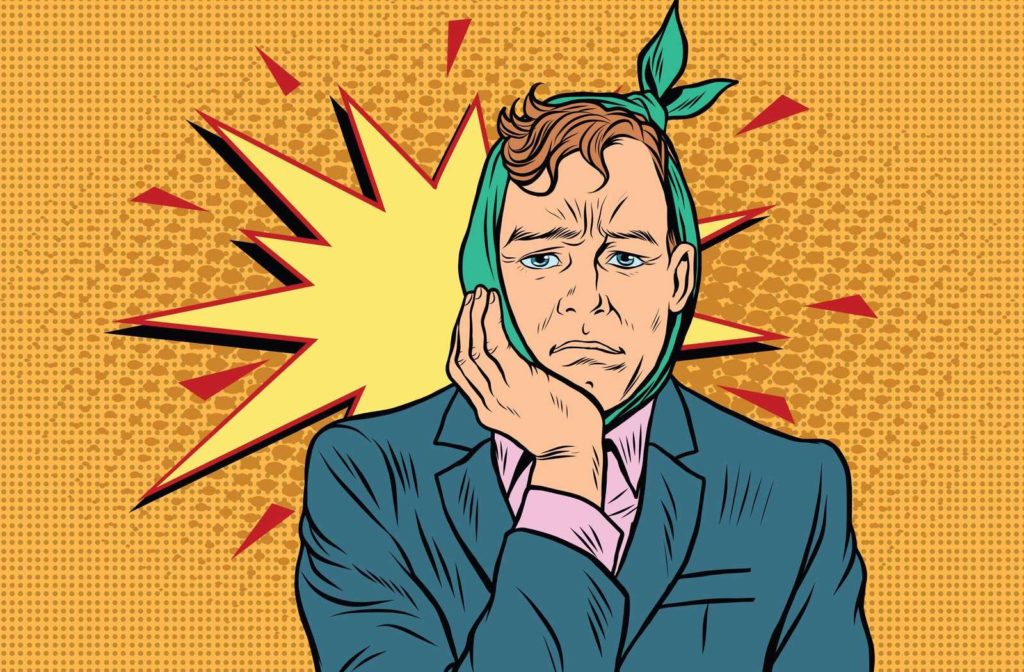
Some of our patients have reported a clicking noise when they open their mouths. It can be quite mysterious to some, and you might be at a loss deciding where you might even find help for it.
Fortunately, we’ve helped a few patients, as it is something your dentist can help with in some cases. Treating or managing TMD can help with clicking or popping, and prevent further complications. For many such patients, the first step is reporting the jaw clicking symptom to your dentist at a routine dental exam.
What Is TMJ?
Your jaw runs up to a joint, where it connects to your skull. This joint is called the temporomandibular joint (TMJ), and it hinges your entire jaw on either side of your head. If all’s well, You’ll hardly notice it. But sometimes recent trauma to the jaw, subtle and inadvertent damage to the joint, genetics, or movement disorders can put stress on the TMJ.
Compared to other joints it’s one of the most complex in the entire human body. It can move in basically any direction, allowing for much of the nimble motions of talking, swallowing, and notably, various types of chewing—especially grinding with your molars.
What Is TMD?
But the TMJ’s complexity means it’s sensitive too. A problem with the muscles, bones, ligaments, or other tissue, immediately connected with it can result in temporomandibular joint disorder (TMD). In cases of movement disorder, the problematic jaw movement is an effect, rather than a cause—which could actually be neurological in origin.
Symptoms of TMD
The symptoms of TMD might be quite familiar to you if you’ve noticed even one of them.
- Difficulty opening or closing your mouth
- Clicking jaw noises
- Popping jaw noises
- Crunching or grinding noise when you:
- Chew food or gum.
- Yawn widely.
- Open your mouth.
- Along with the above symptoms
- Neck pain
- Headaches
What Causes TMD?
Emotional stress could be a factor in TMD. But it’s not clear whether stress causes TMD results from it. There are more possible causes. If you have TMD, it could easily stem from multiple factors. A few risk factors can lead to TMD.
- Joint diseases, like arthritis
- Past jaw injuries
- Fingernail biting
- Wearing
- Movement disorders like bruxism including:
Bruxism & TMD
Bruxism can have other complications working in concert with TMD. While joint injury and arthritis can require the help of physiotherapists and general practice physicians, bruxism can require the help of several specialists, including dentists.
Bruxism
Bruxism involves the clenching, grinding, or gnashing your teeth, and it can affect patients while they’re awake or while they’re asleep. It’s believed that bruxism can make TMD symptoms worse.
Sleep bruxism can manifest as sudden and uncontrollable gnashing of your teeth. Awake bruxism involves a similar effect in some cases.
Awake bruxism can come from emotional stress. It can also be an involuntary behavioural tick surfacing while in deep concentration.
Sleep bruxism can manifest as a sleep-related chewing activity that might owe to a similar emotional stress manifesting during sleep. It can also come from a neurological movement disorder. It’s also linked to sleep disorders like sleep apnea and snoring.
Risk Factors for Bruxism that Could Lead to TMD
Mild bruxism might not need treatment on its own, so it might not increase risk or severity of TMD. But beyond a mild case, bruxism can lead to jaw disorders like TMD, headaches, or damaged teeth requiring restorative work like crowns or fillings. The following risk factors can result in bruxism, which can, in turn, lead to TMD:
- Emotional Stress: anxiety, frustration, and anger
- Younger Age: childhood especially, but some adults
- Personality type: aggressive, competitive, and hyperactive personalities
- Medications & Substances:
- Antidepressants
- Tobacco
- Caffeine
- Recreational Drugs
- Family History of Bruxism
- Other Disorders:
- Parkinson’s disease
- Dementia
- Gastroesophageal Reflux Disorder (GERD)
- Epilepsy
- Night Terrors
- Sleep-Related Disorders such as Sleep Apnea
- Attention-Deficit/Hyperactivity Disorder (ADHD)
Symptoms of Bruxism that Could Worsen Your TMD
If you’re grinding your teeth while you’re awake, you’ll probably notice it, and in that case, you can alert your dentist or doctor to the problem. If jaw popping comes and goes, other symptoms might illuminate the condition a little more.
If you’re on the fence, about whether it’s really a problem, we can assure you that you don’t want bruxism and TMD working together. It’s better to treat one or both of them at the earliest convenience.
Symptoms of sleep bruxism include:
- Teeth grinding or clenching, sometimes loud enough to wake your sleep partner
- Flattened, fractured, chipped or loose teeth
- Worn down enamel layers, exposing the underlying dentin of your tooth
- Chewing marks on your cheeks
For patients who sleep alone, you might be grinding or gnashing your teeth in your sleep without noticing. Your dentist might raise your first concern, and from there we can discuss treatment options.
What Are Some Possible Complications of TMD?
TMD can have effects on your teeth that could lead to further injuries or costly repairs.
Malocclusion
In some patients with TMD, there’s a risk of developing malocclusion as well. Jaw injuries are a notable risk for developing both malocclusion and TMD. Malocclusion means “bad bite.”
Bruxism can play a part as well; as you can probably guess, gnashing your teeth randomly—whether awake or asleep—doesn’t give your jaw the time or positioning needed to bite properly. Some individual teeth can get uneven pressure, as the bite fails to align in a sudden snap or slow grind.
Malocclusion can be expensive to correct, and treatment includes the following:
- Reshaping, Bonding, or Capping Teeth
- Braces
- Removal of Teeth
- Wires or Plates
- Surgery
Of course, with mild malocclusion stemming from TMD, surgery is a lot less likely. But it depends on the condition of the jaw after healing, in cases of jaw injury.
Enamel Wear
Your outer layer of your teeth bear the brunt of the effects of malocclusion, bruxism, or TMD. Worn enamel layers can lead to the need for fillings once they’re allow worn out, but you might notice other symptoms before then. Increased tooth pain or sensitivity indicates your enamel is wearing thin. It can also increase your risk of significant tooth decay.
TMD Treatment
As long as TMD hasn’t advanced too far, and underlying causes like bruxism or arthritis don’t interfere, TMDs can resolve themselves. If you hear popping and clicking noises in your jaw, but you haven’t noticed other symptoms, you might be able to treat it on your own.
Easing a sore jaw muscle is a great home remedy that might work in that case. Try placing a cold or warm compress to your jaw, and gently massage your jaw muscles.
You could also eat a diet of softer foods, cut into very small pieces. It’s best to avoid hard, chewy, or sticky foods.
Try not to open your mouth wide. Keep your mouth relaxed and only slightly open when talking or yawning.
Dental Solutions to TMD
To diagnose TMD, your dentist can conduct a thorough dental exam, complete with x-rays. Then, depending on what they see, they can plot out a treatment plan with your dental and overall health in mind.
Therapy & Medication
We’ve found relaxation techniques, pain or inflammation medication, or sleep coaching get good results for some. We can also refer you to a specialist like a physiotherapist, chiropractor, or maxillofacial surgeon depending on your case of TMD.
Night Guards
We can also set you up with a nightguard, also known as an occlusal splint. This appliance fits over your teeth so that you can bite or grind the splint, cushioning the impact or bite pressure on individual teeth.
Come in for a Dental Exam & Mention Any Symptoms
Your TMD could come from causes that need the help of multiple doctors. Or it might only need a home remedy. The best thing you can do is make an appointment and work with your dentist if there’s any concern. Prevention of complications can save you money and free you from pain, so feel free to contact us!






